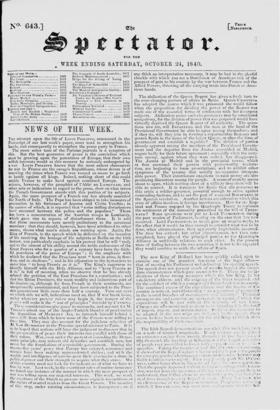The abdication of the Queen Regent has given a fresh
turn to the ever-changing posture of affairs in Spain. Queen CHRISTINA has adopted the course which it was presumed she would follow when the proposition for dividing the power of the Regent was made one of the essential terms of settlement with her insurgent subjects. Abdication under such circumstances may be considered compulsory, for the division of power that was proposed would have virtually deprived the Queen Regent of all authority. The ques- tions now are, will ESPARTERO and the men at the head of the Provisional Government be able to agree among themselves; and if they do, will they join in forming a copartnership Regency and govern Spain in the name of the intent Queen, or alter the form of government and establish a republic? The division of parties already apparent among the members of the Provisional Govern- ment and the deputies from the Juntas assembled at Msdrid, augurs badly tbr their future agreement ; especially when the com- mon enemy, against whom they were united, has disappeared. The Juntas at Madrid and in the provincial towns, which at first exercised their powers with praiseworthy modera- tion, are beginning to issue proscriptions, and to exhibit other symptoms of the tyranny that usually accompanies irrespon- sible power. Their extortionate exactions to raise money are also producing discontent among the people. A scene of anarchy seems about to open, which nothing short of a v despotism will be able to control. It is tbrtunate for Spain that she possesses at this crisis a soldier-governor, powerful enough to strive against contending factions, and to act the part of a second BONAPARTE in the Spanish revolution. Another serious consideration which this state of affairs insolves, is foreign interference. How far are Eng- land and France engaged by the Quadruple Treaty to maintain the settlement of the monarchy prescribed by the will of FERDI• NAND ? Some questions were put to Lord 'PALMERSTON during the past session of Parliament, bearing on the ease that has now occurred. Lord Peest ERSTON, as ueual, gave an evasive reply, to the effect that it would be time enough to consider what was to be done, when circumstances, then apperently improbable, occurred. The time has arrived ; but other eiremestences, not then con- templated, have placed the principal parties to the Quadruple Alliance in unfriendly relations to each other. In the present state of feeling between the two countries, it is not to be expected they would combine to settle the affairs of Spain.


























